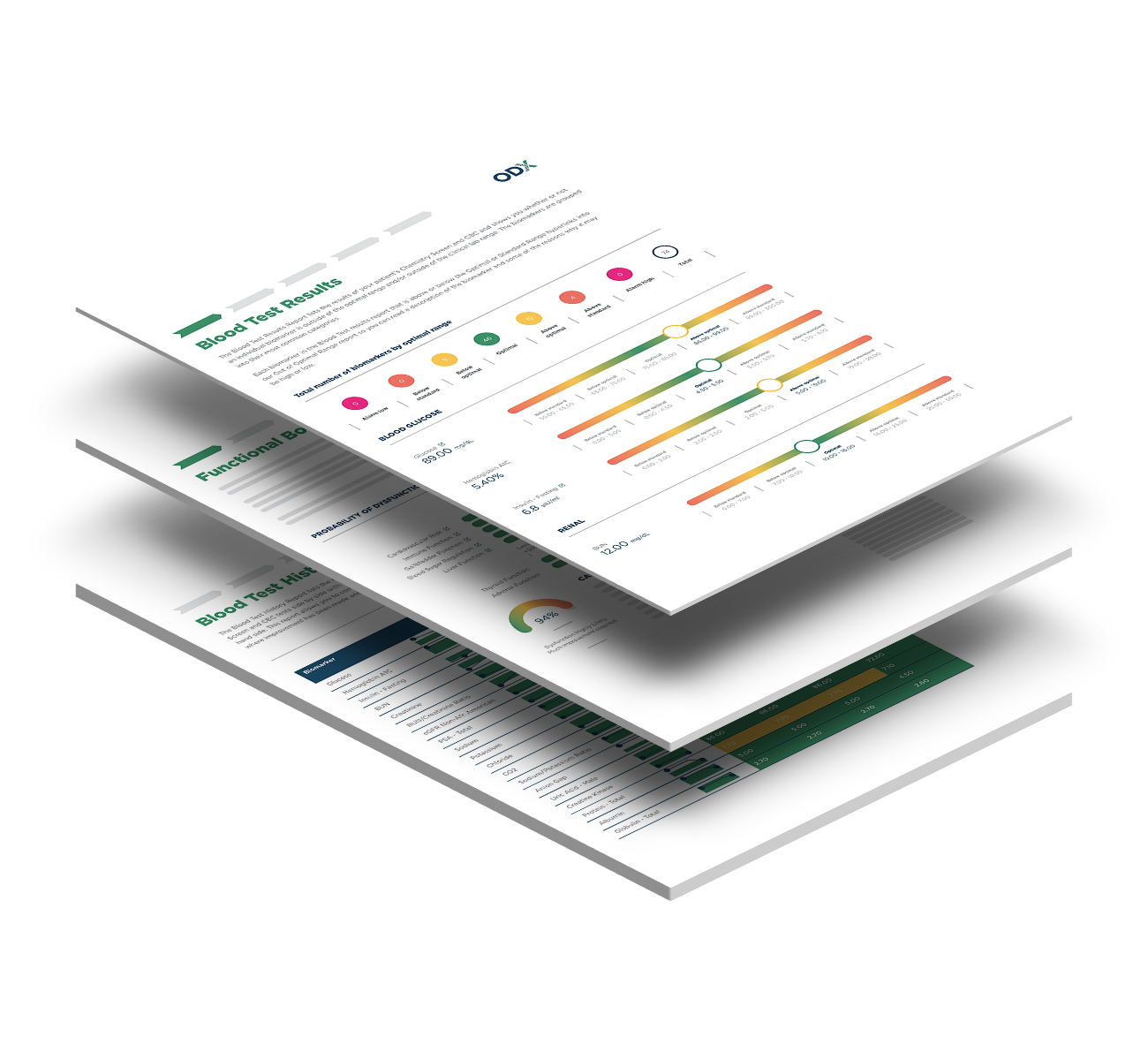Optimal Takeaways
The presence of thyroglobulin antibodies likely reflects damage to the thyroid gland with a release of thyroglobulin into circulation, triggering an autoimmune response. Elevated antibodies are associated with Hashimoto’s autoimmune thyroiditis, Graves’ disease, subacute thyroiditis, and thyroid damage due to environmental factors, and genetic factors can also play a role. Elevated levels may also be seen in rheumatoid arthritis and other autoimmune disorders. A low level of antibodies suggests the absence of active autoimmune thyroid disease.
*Standard Range: 0.00 – 1.00 IU/mL (0.00 – 1.00 kIU/L)
The ODX Range: 0.00 – 1.00 IU/mL (0.00 – 1.00 kIU/L)
Low levels of thyroglobulin antibodies suggest the absence or remission of active autoimmune thyroid disease.
High levels of thyroglobulin antibodies can be associated with Graves’, Hashimoto’s, thyrotoxicosis, myxedema, rheumatoid arthritis, rheumatoid-collagen disease, pernicious anemia, autoimmune hemolytic anemia (Pagana 2021), thyroid cancer (Kim 2010, Vasileiadis 2014, Jia 2020), relapse of Graves’ (Choi 2019), early subacute thyroiditis (Nishihara 2019), nutrient insufficiencies, toxin exposure, and oxidative stress (Ihnatowicz 2020).
Overview
Thyroglobulin (Tg) is a protein precursor to thyroid hormones; it is stored and metabolized in the thyroid gland. Some Tg can leak into the bloodstream due to inflammation, Hashimoto’s, Graves, nodular goiter, or cancer and trigger an immune antibody response. The Tg antibodies can be detected and quantified and should be measured alongside TPO antibodies (Pagana 2021).
The degree of elevation of antibodies appears to be associated with the severity of symptoms in those with Hashimoto’s autoimmune thyroiditis. Elevated antibodies can also be related to environmental and nutritional factors. Environmental factors associated with thyroid autoimmunity include exposure to heavy metals, toxins, and endocrine disruptor chemicals, including bisphenols and phthalates. Other risk factors include a deficiency or excess of nutrients, chronic stress, and oxidative stress. Researchers note that excess oxidative stress, decreased glutathione levels, and antibodies against glutathione peroxidase may be associated with initiating the autoimmune process (Ihnatowicz 2020).
Decreased antioxidant potential in the blood is associated with increased thyroglobulin antibodies and therefore increased risk of autoimmunity. Nutrient deficiencies commonly seen with autoimmune thyroid disease include vitamins A, Bs, C, and D and iodine, iron, zinc, copper, potassium, and magnesium. A magnesium deficiency can increase the risk of thyroid autoimmunity and its associated symptoms, while magnesium itself can reduce thyroglobulin antibodies. While iodine deficiency is a known cause of goiter, an excess of iodine above 1 mg/day may be detrimental to the thyroid and contribute to hypothyroidism (Ihnatowicz 2020).
Thyroglobulin antibodies may be elevated with or without elevations in TPO antibodies in subacute thyroiditis, a condition thought to be caused by a viral infection or its associated inflammation. The degree of Tg antibody elevation in subacute thyroiditis is significantly less than the elevation seen with Hashimoto’s and can resolve over time (Nishihara 2019).
*Beckman Coulter immunometric assay. Other methods of assessing thyroglobulin antibodies may have an alternate range.
References
Choi, Yun Mi et al. “Changes in Thyroid Peroxidase and Thyroglobulin Antibodies Might Be Associated with Graves' Disease Relapse after Antithyroid Drug Therapy.” Endocrinology and metabolism (Seoul, Korea) vol. 34,3 (2019): 268-274. doi:10.3803/EnM.2019.34.3.268
Ihnatowicz, Paulina et al. “The importance of nutritional factors and dietary management of Hashimoto's thyroiditis.” Annals of agricultural and environmental medicine : AAEM vol. 27,2 (2020): 184-193. doi:10.26444/aaem/112331
Jia, Xiaomeng et al. “Clinical Analysis of Preoperative Anti-thyroglobulin Antibody in Papillary Thyroid Cancer Between 2011 and 2015 in Beijing, China: A Retrospective Study.” Frontiers in endocrinology vol. 11 452. 15 Jul. 2020, doi:10.3389/fendo.2020.00452
Kim, Eun Sook et al. “Thyroglobulin antibody is associated with increased cancer risk in thyroid nodules.” Thyroid : official journal of the American Thyroid Association vol. 20,8 (2010): 885-91. doi:10.1089/thy.2009.0384
Nishihara, Eijun et al. “Moderate Frequency of Anti-Thyroglobulin Antibodies in the Early Phase of Subacute Thyroiditis.” European thyroid journal vol. 8,5 (2019): 268-272. doi:10.1159/000501033
Pagana, Kathleen Deska, et al. Mosby's Diagnostic and Laboratory Test Reference. 15th ed., Mosby, 2021.
Vasileiadis, Ioannis et al. “Thyroglobulin antibodies could be a potential predictive marker for papillary thyroid carcinoma.” Annals of surgical oncology vol. 21,8 (2014): 2725-32. doi:10.1245/s10434-014-3593-x







